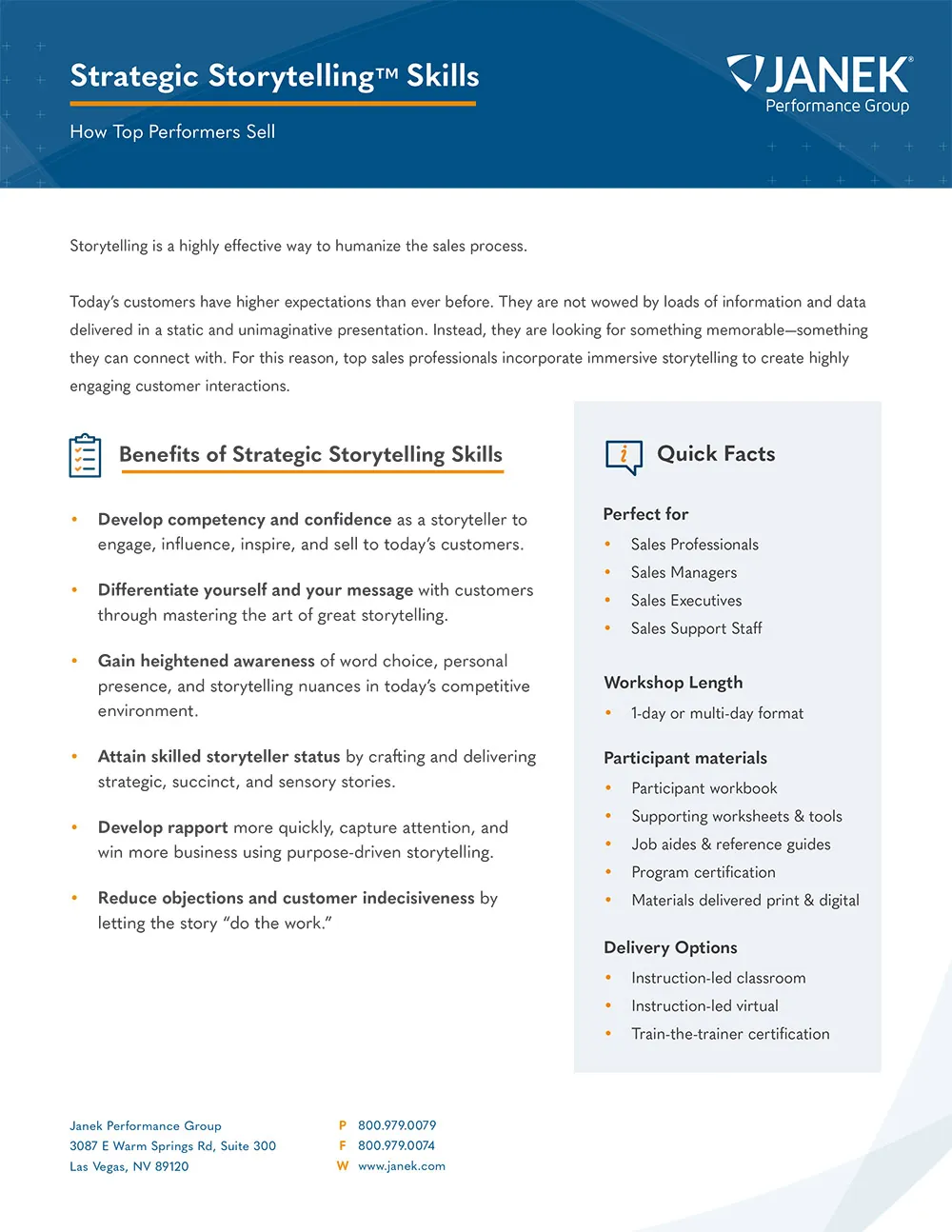Learn How to Leverage Stories for Highly Engaging Sales Interactions.
Storytelling is a highly effective way to humanize the sales process.
Today’s customers have higher expectations than ever before. They are not wowed by loads of information and data delivered in a static and unimaginative presentation. Instead, they are looking for something memorable—something they can connect with. For this reason, top sales professionals incorporate immersive storytelling to create highly engaging customer interactions.

Download the Brochure
More information about the Strategic Storytelling Skills program is available in this downloadable PDF.
Strategic Storytelling™ Skills FAQ
While buyers consider facts, data, and statistics when evaluating a product or service, emotions are the primary driving force that compels them to act. Examples of emotions that can motivate prospects include fear, greed, a sense of belonging, pride, anger and trust.
Weaving a story or two into a sales presentation can be a persuasive technique that enables the salesperson to forge an emotional connection with the prospect that transcends logic or common sense. For example, when people shop for a new car, they’re typically more concerned with how owning and driving the vehicle makes them feel instead of how much it costs. If they make a positive emotional connection with the car, they can usually justify the price.
The best salespeople understand this concept and use it to their advantage. They use their presentation and storytelling skills to paint a picture of how purchasing the car will make the buyer’s life better.
Business and corporate storytelling training encompasses several essential components.
Buyer Identification: The most effective sales stories are ones that resonate with the prospect. Therefore, sales storytelling training should focus on techniques that enable salespeople to identify with buyers and determine what makes them tick. This process makes it possible to craft an engaging story that addresses their specific needs and interests.
Structure: A story that wanders and appears to have no point will cause the prospect to tune out quickly. Every story must have a beginning, a middle and an end. This structure takes the prospect on a journey that ultimately demonstrates how the salesperson’s product or service previously solved a similar problem that the buyer is experiencing. Making the prospect the center or “hero” of the story will enhance its effectiveness and make it more relatable.
Messaging: Every story should have a clear, compelling message that aligns with the sales objective. It should demonstrate the unique selling or value proposition the buyer will experience from the purchase. The narrative should also include simple, easy-to-understand language that contains no complex terminology or industry jargon.
Emotional Connection: Since emotions are the driving force behind most sales, consumer or business storytelling training should cover techniques for using stories to forge an emotional connection with the buyer. One effective method involves using relatable anecdotes to evoke emotions like excitement, empathy and trust, making the story more memorable and compelling.
Taking Action: The conclusion of the story should include a call to action to guide the prospect to the next phase of the sales process. In some situations, making a purchase may not be the objective. Depending on the product, service or industry, the succeeding step in the sales cycle could be scheduling a demo, setting up a consultation or requesting additional product or pricing information.
Practice: Compelling storytelling is an acquired capability instead of a natural skill for most salespeople. Sales storytelling training should offer ample opportunities to practice and perfect the delivery. The presentation should come across as spontaneous and unrehearsed to the prospect.


























